Unit 6 An Unusual Day Part A课件(45张PPT)
文档属性
| 名称 | Unit 6 An Unusual Day Part A课件(45张PPT) | 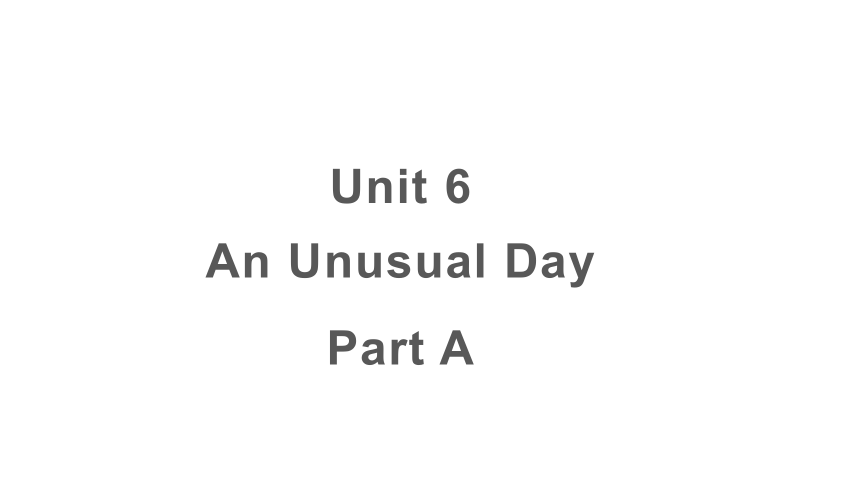 | |
| 格式 | pptx | ||
| 文件大小 | 7.3MB | ||
| 资源类型 | 教案 | ||
| 版本资源 | 闽教版(三年级起点) | ||
| 科目 | 英语 | ||
| 更新时间 | 2021-08-23 08:41:57 | ||
图片预览

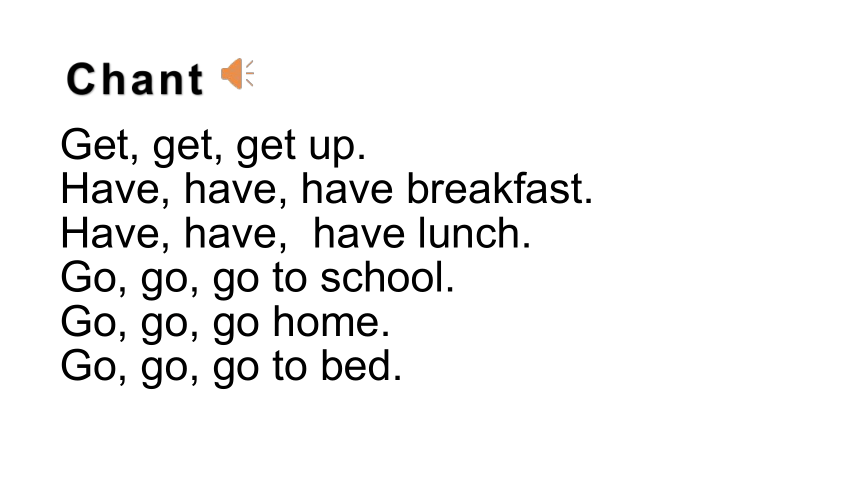
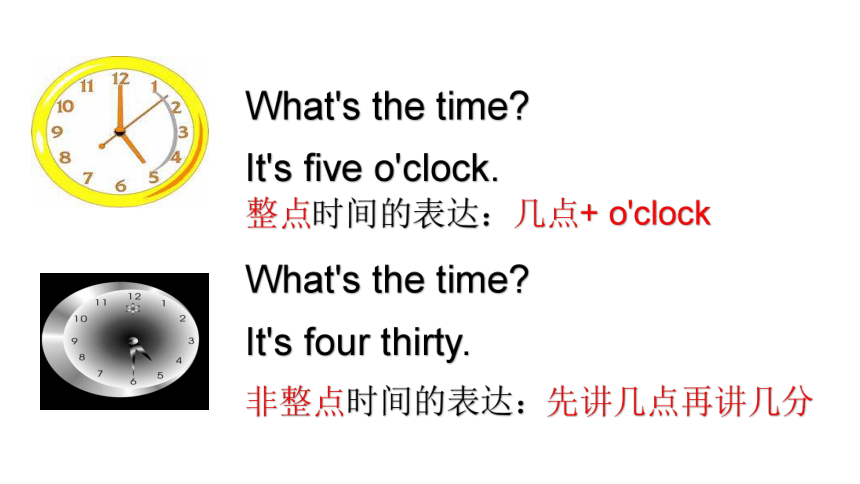

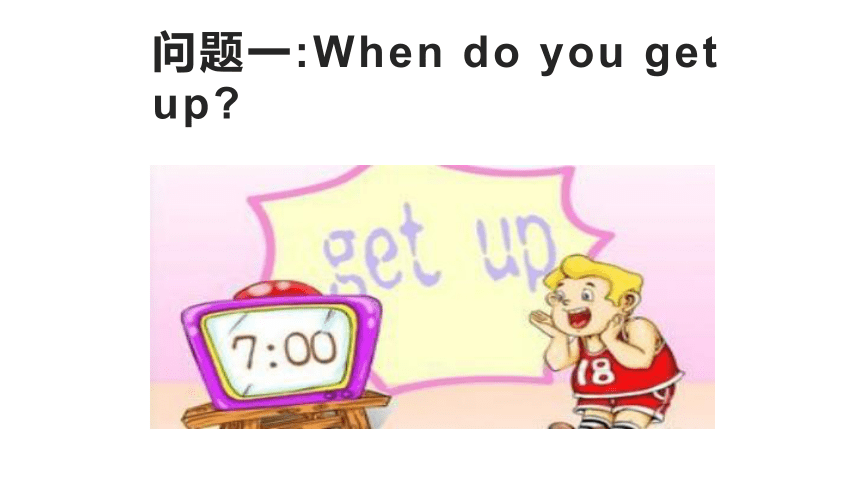
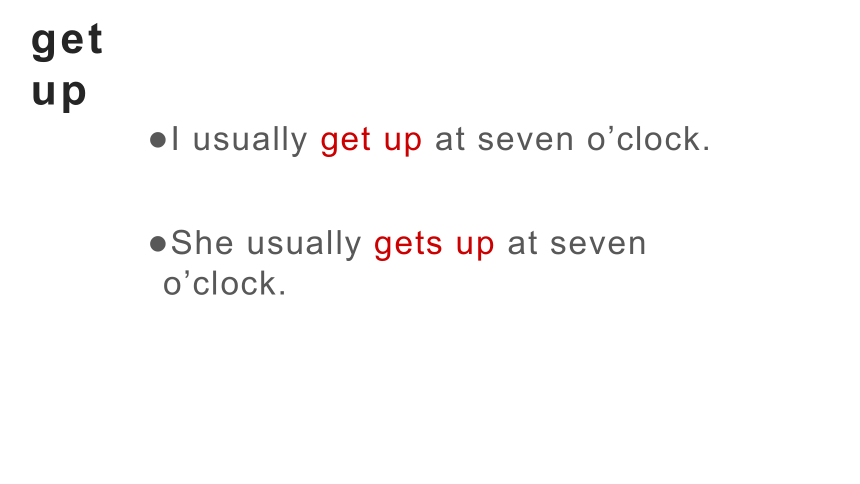

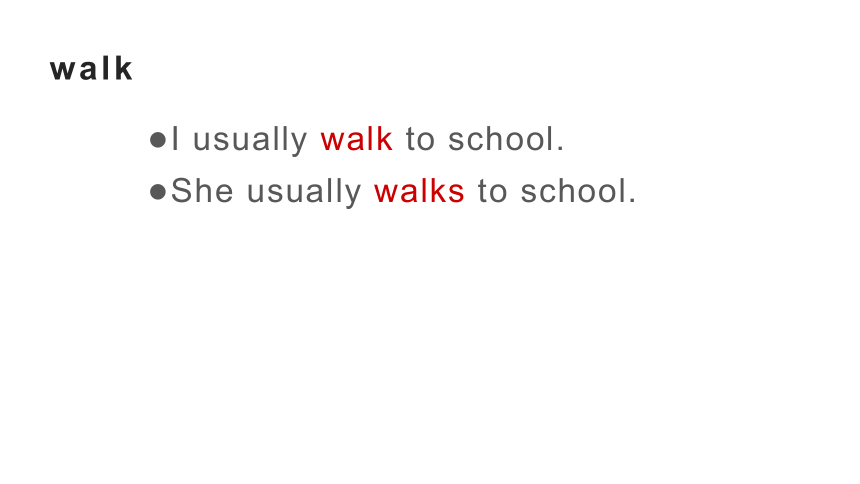
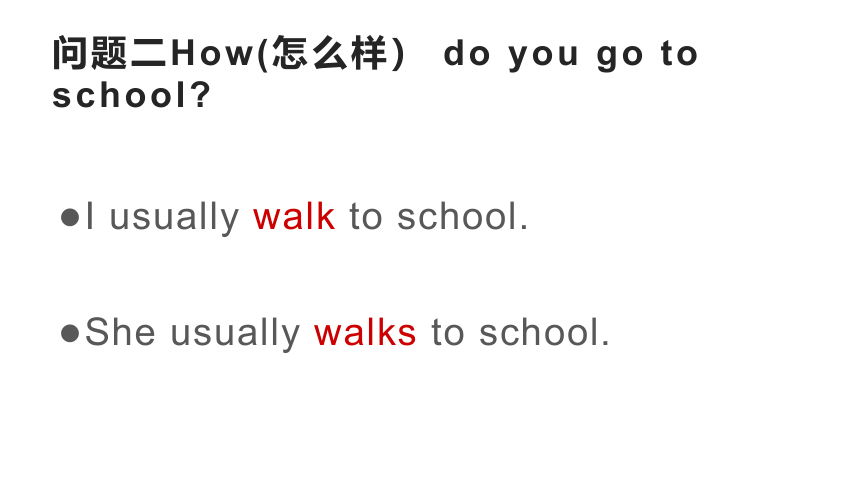

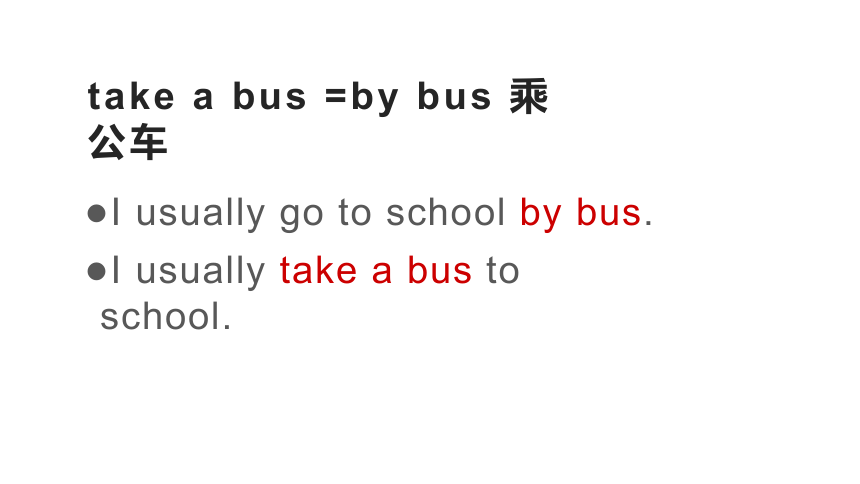
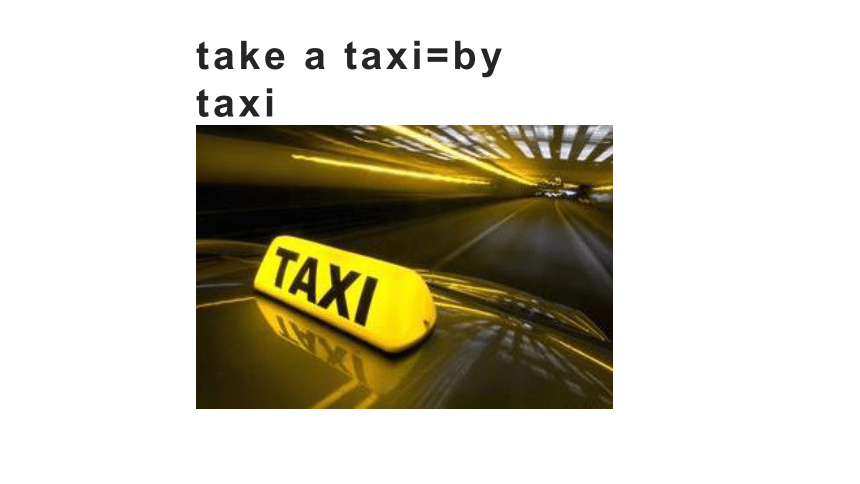
文档简介
(共45张PPT)
Unit
6
An
Unusual
Day
Part
A
Chant
Get,
get,
get
up.
Have,
have,
have
breakfast.
Have,
have,
have
lunch.
Go,
go,
go
to
school.
Go,
go,
go
home.
Go,
go,
go
to
bed.
What's
the
time?
It's
five
o'clock.
整点时间的表达:几点+
o'clock
What's
the
time?
It's
four
thirty.
非整点时间的表达:先讲几点再讲几分
get
up起床
问题一:When
do
you
get
up?
get
up
I
usually
get
up
at
seven
o’clock.
She
usually
gets
up
at
seven
o’clock.
walk
=
on
foot
步行
I
walk
to
school.=I
go
to
school
on
foot.
walk
to
school
走路去上学
walk
I
usually
walk
to
school.
She
usually
walks
to
school.
问题二How(怎么样)
do
you
go
to
school?
I
usually
walk
to
school.
She
usually
walks
to
school.
take
a
bus
乘公交车
take
a
bus
=by
bus
乘公车
I
usually
go
to
school
by
bus.
I
usually
take
a
bus
to
school.
take
a
taxi=by
taxi
问题三:
How
do
you
go
to
school?
I
usually
go
to
school
by
taxi.
I
usually
take
a
taxi
to
school.
When
do
you
get
to
school?
(到达学校)
I
get
to
school
at
_________.
She
gets
to
school
at
________.
at
(在…点钟)
half(半,一半)
half
past
six
六点半
half
past
nine
九点半
half
past
twelve
十二点半
How
about
Wan
Tao's
unusual
day?
When
does
Wang
Tao
usually
get
up?
How
does
he
usually
go
to
school?
When
does
he
usually
get
to
school?
读课文回答问题
When
does
Wang
Tao
usually
get
up?
How
does
he
usually
go
to
school?
When
does
he
usually
get
to
school?
at
在…点钟
Wang
Tao
usually
gets
up
at
six
thirty.
at
six
thirty在六点半=at
half
past
six
by
bike
How
does
he
go
to
school?
Wang
Tao
usually
goes
to
school
by
bike.
When
does
he
usually
get
to
school?
He
usually
gets
to
school
at
seven
twenty.
But
this
morning
He
got
up
at
half
past
seven.
He
took
a
taxi.
He
got
to
school
at
eight
o’clock.
王涛的作息时间表
Wang
Tao’s
Daily
Schedule
说句子:Wang
Tao
usually
at
.
get
up
6:30
have
breakfast
6:45
get
to
school
7:00
have
lunch
12:00
go
home
4:
50
have
dinner
6:00
读句子,与短文相符的画笑脸,不符的画哭脸。
1.This
morning
Wang
Tao
got
up
at
6:00.(
)
2.Wang
Tao
took
a
taxi
this
morning.(
)
3.
He
was
late
for
school
this
morning.(
)
4.
He
usually
gets
to
school
at
7:22.(
)
一般过去时
表示该动作发生在过去。
时间标志:
yesterday,
just
now,
in
summer,
in
the
morning,
this
morning
...
动词要变成相对应的过去式
play—
_______
visit—
_______
sweep(打扫)—________
clean(把..弄干净)—
_______
help—
______
wash(洗)—
________
played
visited
过去式
规则变化(—ed)
cleaned
helped
washed
sweeped
is—______
am—
_____
are—______
go—_____
buy—______
take—______
swim—_______
make—______
get—
_______
say—_______
were
went
was
was
bought
took
swam
动词的不规则变化
made
got
said
在英语的说话和朗读中,不但要注意意群的划分,还要注意句子的语调。有时同样一句话,如果用了不同的语调,就会给听的人以不同的了解和感觉。本课学习降调,降调主要用于陈述句,以疑问词what,who,when,where,why,how,which开头的特殊疑问句、祈使句和感叹句,也要用降调。
This
morning
she_____
up
at
7:30.
A.
get
B.
got
C.
gets
2.She
didn’t
____
breakfast
yesterday
afternoon.
A.have
B.
had
C.
has
3.—When
did
you
____
to
school?
—
I
____
to
school
at
7:00.
A.
go,
went
B.
went,
went
C.
go,
goes
4.She
usually
____
to
school
at
7:15.But
this
morning
she
____
to
school
at
8:00.
A.went,
went
B.
goes,
went
C.
goes,
got
B
A
A
B
Summary
一般过去式表示过去某个时间里发生的非持续性动作或存在的状态,也表示过去经常或反复发生的动作。用动词的过去式表示,常和表示过去的时间状语连用,如:
Yesterday
昨天
last
night
昨天晚上
two
days
ago
两天前
this
morning
今天早上
动词原形及其过去式
原形
过去式
is
was
do
did
go
went
get
got
take
took
walk
walked
have
had
动词变化对比
一般现在时
一般过去式
get
up
got
up
/gets
up
walk
to
school
walked
to
school
/walks
to
school
take
a
taxi
took
a
taxi
/takes
a
taxi
get
to
school
got
to
school
/
gets
to
school
Late(迟到)
Last
night
(昨天晚上)
I
went
to
bed
late
Two
hours
late.
This
morning(今天早上)
I
got
up
late,
An
hour
late.
Too
bad,
too
bad,
I
got
to
school
late,
Ten
minutes
late.
区别词组
get
up
起床
get
into
上车
get
to
the
school
到达学校
get
home
到家
I/We/They
+
usually+动词原形
He/She/It
+
usually+动词s或者es
(不管主语是谁)+this
morning+动词ed
(不管主语是谁)+can+动词原形
一般现在时表示经常性,规律性,习惯性的状态或者动作。如每天起床,吃饭,上学,一个星期去几次超市等。这个动作经常发生,是一般的情况,而不是具体的某一次。还有些动作或状态是永恒的,如地球绕着太阳转,太阳从东方升起等。
标志性的词有:
usually,
sometimes,
always,
often,
every
morning,
every
week,
every
day
usually
(often/
sometimes/
always
everyday
/every
morning
/every
week)
this
morning
(
last
night
/
yesterday)
can
(
may
/
must
/
need)
English
Proverb
(英语谚语)
Early
to
bed
and
early
to
rise
makes
a
man
healthy,wealthy
and
wise.
早睡早起让人变得健康富有智慧!
Homework:
听课文录音,模仿并熟读课文。
完成本课的练习。
用动词过去式写出你的不寻常的一天。
Time
waits
for
no
man.
时间不等人。
Never
be
late!
Early
to
bed
and
early
to
rise
makes
a
man
healthy.
早睡早起身体好。
Unit
6
An
Unusual
Day
Part
A
Chant
Get,
get,
get
up.
Have,
have,
have
breakfast.
Have,
have,
have
lunch.
Go,
go,
go
to
school.
Go,
go,
go
home.
Go,
go,
go
to
bed.
What's
the
time?
It's
five
o'clock.
整点时间的表达:几点+
o'clock
What's
the
time?
It's
four
thirty.
非整点时间的表达:先讲几点再讲几分
get
up起床
问题一:When
do
you
get
up?
get
up
I
usually
get
up
at
seven
o’clock.
She
usually
gets
up
at
seven
o’clock.
walk
=
on
foot
步行
I
walk
to
school.=I
go
to
school
on
foot.
walk
to
school
走路去上学
walk
I
usually
walk
to
school.
She
usually
walks
to
school.
问题二How(怎么样)
do
you
go
to
school?
I
usually
walk
to
school.
She
usually
walks
to
school.
take
a
bus
乘公交车
take
a
bus
=by
bus
乘公车
I
usually
go
to
school
by
bus.
I
usually
take
a
bus
to
school.
take
a
taxi=by
taxi
问题三:
How
do
you
go
to
school?
I
usually
go
to
school
by
taxi.
I
usually
take
a
taxi
to
school.
When
do
you
get
to
school?
(到达学校)
I
get
to
school
at
_________.
She
gets
to
school
at
________.
at
(在…点钟)
half(半,一半)
half
past
six
六点半
half
past
nine
九点半
half
past
twelve
十二点半
How
about
Wan
Tao's
unusual
day?
When
does
Wang
Tao
usually
get
up?
How
does
he
usually
go
to
school?
When
does
he
usually
get
to
school?
读课文回答问题
When
does
Wang
Tao
usually
get
up?
How
does
he
usually
go
to
school?
When
does
he
usually
get
to
school?
at
在…点钟
Wang
Tao
usually
gets
up
at
six
thirty.
at
six
thirty在六点半=at
half
past
six
by
bike
How
does
he
go
to
school?
Wang
Tao
usually
goes
to
school
by
bike.
When
does
he
usually
get
to
school?
He
usually
gets
to
school
at
seven
twenty.
But
this
morning
He
got
up
at
half
past
seven.
He
took
a
taxi.
He
got
to
school
at
eight
o’clock.
王涛的作息时间表
Wang
Tao’s
Daily
Schedule
说句子:Wang
Tao
usually
at
.
get
up
6:30
have
breakfast
6:45
get
to
school
7:00
have
lunch
12:00
go
home
4:
50
have
dinner
6:00
读句子,与短文相符的画笑脸,不符的画哭脸。
1.This
morning
Wang
Tao
got
up
at
6:00.(
)
2.Wang
Tao
took
a
taxi
this
morning.(
)
3.
He
was
late
for
school
this
morning.(
)
4.
He
usually
gets
to
school
at
7:22.(
)
一般过去时
表示该动作发生在过去。
时间标志:
yesterday,
just
now,
in
summer,
in
the
morning,
this
morning
...
动词要变成相对应的过去式
play—
_______
visit—
_______
sweep(打扫)—________
clean(把..弄干净)—
_______
help—
______
wash(洗)—
________
played
visited
过去式
规则变化(—ed)
cleaned
helped
washed
sweeped
is—______
am—
_____
are—______
go—_____
buy—______
take—______
swim—_______
make—______
get—
_______
say—_______
were
went
was
was
bought
took
swam
动词的不规则变化
made
got
said
在英语的说话和朗读中,不但要注意意群的划分,还要注意句子的语调。有时同样一句话,如果用了不同的语调,就会给听的人以不同的了解和感觉。本课学习降调,降调主要用于陈述句,以疑问词what,who,when,where,why,how,which开头的特殊疑问句、祈使句和感叹句,也要用降调。
This
morning
she_____
up
at
7:30.
A.
get
B.
got
C.
gets
2.She
didn’t
____
breakfast
yesterday
afternoon.
A.have
B.
had
C.
has
3.—When
did
you
____
to
school?
—
I
____
to
school
at
7:00.
A.
go,
went
B.
went,
went
C.
go,
goes
4.She
usually
____
to
school
at
7:15.But
this
morning
she
____
to
school
at
8:00.
A.went,
went
B.
goes,
went
C.
goes,
got
B
A
A
B
Summary
一般过去式表示过去某个时间里发生的非持续性动作或存在的状态,也表示过去经常或反复发生的动作。用动词的过去式表示,常和表示过去的时间状语连用,如:
Yesterday
昨天
last
night
昨天晚上
two
days
ago
两天前
this
morning
今天早上
动词原形及其过去式
原形
过去式
is
was
do
did
go
went
get
got
take
took
walk
walked
have
had
动词变化对比
一般现在时
一般过去式
get
up
got
up
/gets
up
walk
to
school
walked
to
school
/walks
to
school
take
a
taxi
took
a
taxi
/takes
a
taxi
get
to
school
got
to
school
/
gets
to
school
Late(迟到)
Last
night
(昨天晚上)
I
went
to
bed
late
Two
hours
late.
This
morning(今天早上)
I
got
up
late,
An
hour
late.
Too
bad,
too
bad,
I
got
to
school
late,
Ten
minutes
late.
区别词组
get
up
起床
get
into
上车
get
to
the
school
到达学校
get
home
到家
I/We/They
+
usually+动词原形
He/She/It
+
usually+动词s或者es
(不管主语是谁)+this
morning+动词ed
(不管主语是谁)+can+动词原形
一般现在时表示经常性,规律性,习惯性的状态或者动作。如每天起床,吃饭,上学,一个星期去几次超市等。这个动作经常发生,是一般的情况,而不是具体的某一次。还有些动作或状态是永恒的,如地球绕着太阳转,太阳从东方升起等。
标志性的词有:
usually,
sometimes,
always,
often,
every
morning,
every
week,
every
day
usually
(often/
sometimes/
always
everyday
/every
morning
/every
week)
this
morning
(
last
night
/
yesterday)
can
(
may
/
must
/
need)
English
Proverb
(英语谚语)
Early
to
bed
and
early
to
rise
makes
a
man
healthy,wealthy
and
wise.
早睡早起让人变得健康富有智慧!
Homework:
听课文录音,模仿并熟读课文。
完成本课的练习。
用动词过去式写出你的不寻常的一天。
Time
waits
for
no
man.
时间不等人。
Never
be
late!
Early
to
bed
and
early
to
rise
makes
a
man
healthy.
早睡早起身体好。
同课章节目录
- Unit 1 The Olympic Games
- Part A
- Part B
- Part C
- Unit 2 Physical Exercises
- Part A
- Part B
- Part C
- Unit 3 Food and Health
- Part A
- Part B
- Part C
- Unit 4 Buying New Clothes
- Part A
- Part B
- Part C
- Review 1
- Unit 5 Housework
- Part A
- Part B
- Part C
- Unit 6 An Unusual Day
- Part A
- Part B
- Part C
- Unit 7 Thanksgiving
- Part A
- Part B
- Part C
- Unit 8 The Universe
- Part A
- Part B
- Part C
- Review 2
